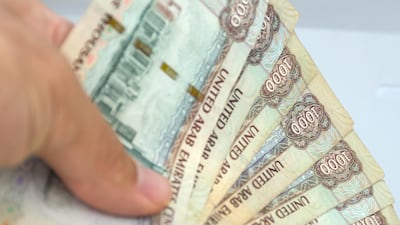Measures by the Central Bank of the UAE designed to help borrowers offset the effects of the coronavirus pandemic will help residents meet their debt repayments and boost the country’s property sector, according to analysts.
Under the Dh100 billion economic stimulus package unveiled by the regulator on Saturday, lenders in the UAE were ordered to "treat all their customers fairly" and grant "temporary relief" on retail clients' loan payments for up to six months from March 15.
"An economic slowdown increases the threat of layoffs and salary cuts, so the option of postponing debt repayments can go a long way in making sure people can focus on meeting their living expenses and immediate financial commitments first," said Ambareen Musa, the founder and chief executive of UAE-based financial comparison platform Souqalmal.com.
There were 6.5 million credit facilities such as loans, credit cards, mortgages and overdrafts in the UAE, according to November 2018 data from the Al Etihad Credit Bureau, with approximately 3 million active borrowers.
Under the central bank's Targeted Economic Support Scheme — which aims to "support the economy and protect consumers" — banks can offer "temporary relief" on a loan's principal amount and the associated interest for all “affected” retail customers. A loan's principal is the monthly payment a borrower agrees to pay their lender each month, which does not include the interest.
HSBC said it always "puts its customers first to help them navigate challenging circumstances".
"With the full impact of the coronavirus on the global economy still unknown it is particularly encouraging to see such positive action from the Central Bank of the UAE," Abdulfattah Sharaf, UAE chief executive and head of international, HSBC Bank Middle East, told The National.
Lenders should unveil more detailed criteria around who qualifies for a break in repayments soon, said Ms Musa.
“However, it is likely that banks may have the discretion to decide who should receive the temporary relief from repayments, and what debt categories, such as mortgages, personal loans and credit cards, this payment holiday will cover.”
How the banks implement the relief depends on how severely the UAE is affected by the outbreak, said Jonathan Rawling of UAE financial comparison site yallacompare, who expects the virus to create three categories of consumers that may need relief.
“There are those that are infected and are quarantined; those that may be affected and either choose or are told to self-isolate and those that may not be directly affected by the virus but have less work or reduced salary due to the effects of the virus on industry and the leisure and tourism industries in particular,” he said.
The UAE has already made the significant step of ensuring everyone treated for the condition is not charged for their care so that medical bills are not a source of financial hardship, said Mr Rawling.
“What we don’t yet know is exactly what the rules will be for employees dependent on jobs in 'cancelled' industries," he added. "Perhaps the support will be for business to continue to pay these individuals."
Customers cannot expect their debts "to be waived in whole or even in part", he added.
Some banks have already implemented new measures for customers. Citi has made fund transfers free via its mobile app for retail customers, which is effective until Thursday, 30 April 2020. The bank is also donating 0.5 per cent of its debit card spends in March to support the fight against Covid-19.
“Instead of visiting a branch or ATM to withdraw money or request a transfer, we encourage our clients to complete your local transfers from the convenience of their home,” said Dinesh Sharma, head of Citi's Middle East consumer bank division.
A separate measure from the central bank increased loan-to-value ratios applicable on mortgage loans for first-time buyers by 5 percentage points.
"This is positive news for first time buyers as the biggest challenge is the cash required upfront to complete on a purchase," says Brendan Kennelly, a senior mortgage consultant at Mortgage Finder, part of the Property Finder Group.
Under the new measures, the upfront cash deposit required to buy a property has decreased to 20 per cent from 25 per cent for first time expatriate buyers, says Mr Kennelly, and from 20 per cent to 15 per cent for Emiratis.
“It’s not clear whether this is for all properties including purchases over Dh5 million,” adds Mr Kennelly. “The expectation is that the banks will apply this immediately.”
The central bank's move to make property more affordable for first-time buyers is "a welcome move", said Mario Volpi, the sales and leasing manager at Engel & Volkers, "not just now due to the coronavirus but the timing … will give that extra push to first-time buyers who may have been thinking about taking the plunge into owning real estate".
Mr Volpi said it is too early to assess if this movie is temporary or whether it will become "the norm".
"Either way, it should be a shot in the arm for the property market, especially the secondary market," he added.


